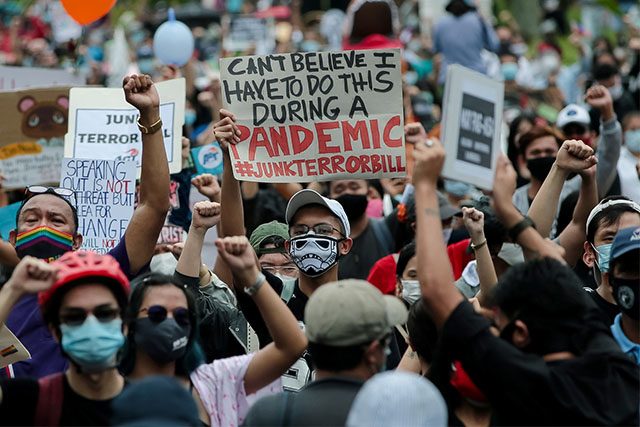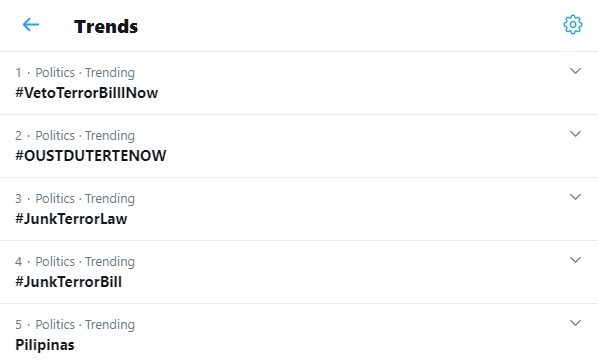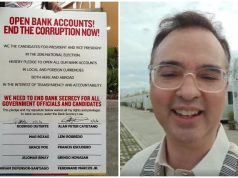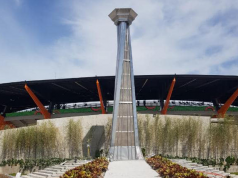
Calls to declare the national government’s counter-terrorism act unconstitutional and to revoke it altogether trended on social media after President Rodrigo Duterte signed the controversial bill into law on Friday.
Duterte signed the Republic Act No. 11479 or the Anti-Terrorism Act of 2020 on July 3 after he received the recommendations of the Department of Justice and the Office of the Chief Presidential Legal Counsel on the proposal.
Presidential spokesperson Harry Roque confirmed this to reporters.
READ: Duterte signs anti-terrorism bill into law — spokesman
“As we have said, the president, together with his legal team, took time to study this piece of legislation weighing the concerns of different stakeholders,” Roque said.
He said that the passage of the anti-terror law will strengthen the country’s dedication to “stamp out terrorism.”
“The signing of the aforesaid law demonstrates our serious commitment to stamp out terrorism, which has long plagued the country and has caused unimaginable grief and horror to many of our people,” Roque said.
“Together, let us defeat terrorism and make our communities safe and secure under the rule of law,” he added.
In his national address last June 22, Duterte had expressed his goal to rid to the country of communist insurgency as his top priority amid the COVID-19 pandemic, wherein the number of Filipinos who tested positive for the deadly virus continues to rise.
“The fight against — fight against the NPAs has long been there. It started in the 50s hanggang ngayon nandiyan pa. It has undermined the national security of the country,” he said.
The Department of Interior and Local Government also assured the public that they should not fear the new law’s provisions.
Dissent against the passage dominated Twitter
Hashtags and words related to calls to revoke the anti-terror law and oust Duterte from office immediately dominated the Philippine Trends on Twitter after its passage.

Rep. Sarah Elago (Kabataan Party-list) and Rep. Eufemia Cullamat (Bayan Muna Party-list) said the fight against the anti-terror law continues.
PAG-ASA AT TATAG! MAY LABAN PA TAYO: #JunkTerrorLaw
Isulong ang kalusugan, kabuhayan at karapatan ✊🙏— Sarah Elago (@sarahelago) July 3, 2020
TULOY PARIN SA PANAWAGN IBASURA ANG ANTI TERROR BILL! https://t.co/L6CxdJZ0Fj
— BAYAN MUNA Rep. Eufemia Cullamat (@EufemiaCullamat) July 3, 2020
Bar topnotcher Kenneth Glenn Manuel called on the Supreme Court to declare the law unconstitutional.
Considering that some government officials loosely (bordering to recklessly) tag persons as "terrorists", this new law has a chilling effect against the expression of dissent. #DeclareAntiTerrorLawUnconstitutional
— K Manuel (@theklmanuel) July 3, 2020
Another user, meanwhile, shared photos of the lawmakers who approved the measure during hearings in Congress.
remember their names. they made this happen. pic.twitter.com/s2YlPZU61I
— seiichi (@holyMARLBOR0) July 3, 2020
Influential civic and legal organizations, such as the Integrated Bar of the Philippines and the National Union of People’s Lawyers, and human rights groups have previously expressed strong opposition to some of the measure’s provisions.
They perceived these provisions could curtail free speech and violate on Filipinos’ basic civil liberties.
Online calls to scrap the controversial act, which eventually translated into street protests last Independence Day and the Metro Manila Pride March, have been circulating on Twitter and Facebook since its passage at the Senate last February, and then the House’s adoption of this version last May 29.
Such a widespread opposition was joined by big names in the local entertainment industry such as Kathryn Bernardo, Nadine Lustre, Angel Locsin and Catriona Gray, as well as some international celebrities such as Taylor Swift, Bretman Rock and Aquaria.
On June 8, amid the withdrawal of support from members of the Lower House, House Speaker Alan Peter Cayetano and Senate President Vicente Sotto III approved the then-proposed measure and transmitted it to the Office of the President via email.
Because of the massive criticisms, Sotto and Senator Panfilo “Ping” Lacson, both primary authors of the law, have been aggressively defending it online.









